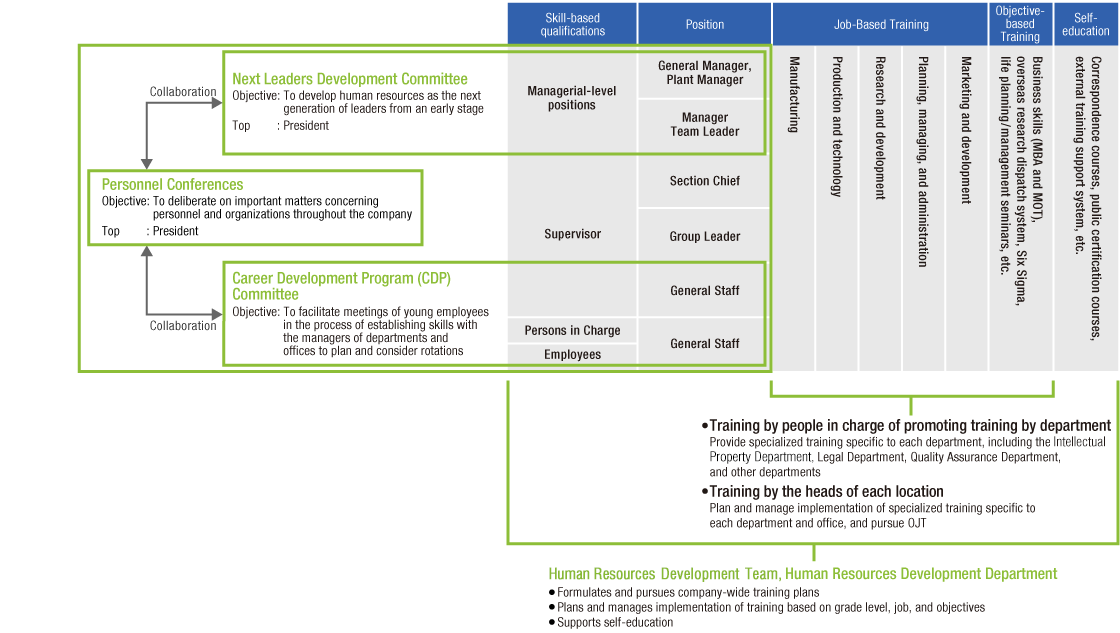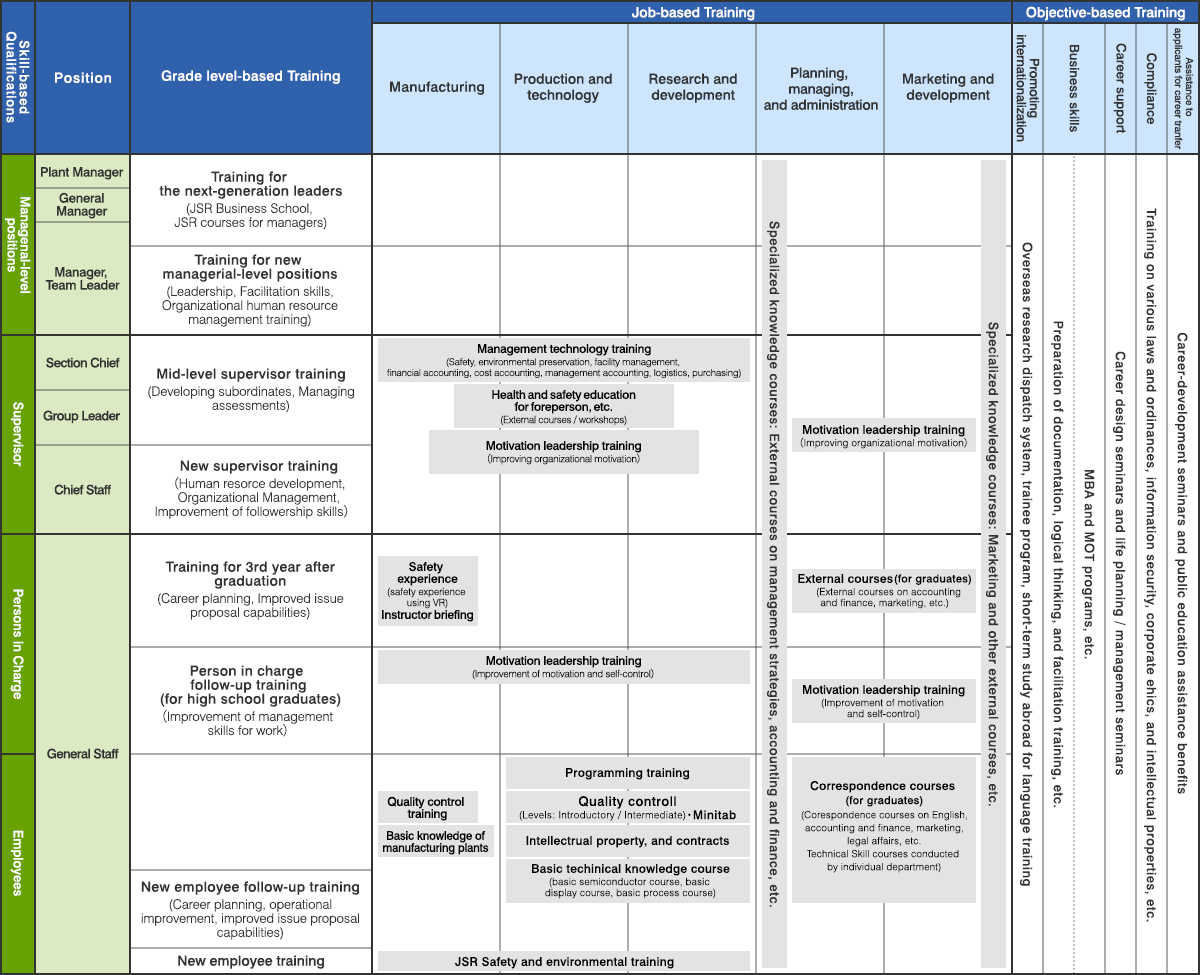Human Resource Development
Governance and Management Framework
JSR Corporation's Human Resource Management Team in the Human Resource Development Department takes the lead in planning company-wide training programs and advancing human resource development in close alignment with various personnel systems and management-level personnel meetings. In addition, departmental education advancement officers and the personnel responsible in each department plan, implement, and manage specialized education tailored to their departments and sections.

Policy and Basic Approach
JSR Group believes employee growth to be corporate growth, the foundation for the realization of its Corporate Mission and medium- to long-term management strategies, and the basis for the creation of value company-wide. To encourage self-led career development* by every employee, enhance each individual’s value, and enable employees to fully utilize their abilities, the JSR Group has established the following elements as its human resource development policy.
Human Resource Development Policy
- 1.Provide sufficient support for employees, including supervisors, subordinates and team members, to focus on their own desire to grow and take the initiative in improving their own skills and building their careers.
- 2.Developing and cultivating the abilities of employees is the foundation of the company. The greatest priority is growth through work. Structured, systematic, ongoing training tailored to the career vision of each and every employee is provided to supplement this from a company-wide, long-term perspective.
- *Self-Led Career Development
JSR Group defines Self-Led Career Development as "developing a career vision of work and life, growing and increasing one's value through sustained efforts to achieve that vision and the experience that comes with it, all for the betterment of one’s life.”
Metrics and Targets
JSR Group's purpose of human resource development are to establish mechanism and corporate culture in which the company and individuals grow together and to develop human resources who can realize our Corporate Mission of "Materials Innovation.” To achieve these purpose, JSR Group aims to develop human resources who embody the following “ideal personnel traits.”
- Ideal personnel traits
-
- Human resources able to take on the challenge of new value creation utilizing various experiences using unconventional approaches
- Human resources who can think from a global perspective in everything they do
- Human resources who can grow together and actively collaborate/cooperate internally and externally while emphasizing two-way communication
- Human resources who embrace each other and different ways of thinking transcending differences in terms of gender, culture, generation and age, etc.
- Human resources with their own career vision who can contribute to the company/society and their own self-actualization by taking action proactively.
Initiatives
1. OJT
JSR Corporation places the highest priority on “growth through work” via OJT, and have produced formulated “Seven Articles of OJT” (Trainer’s Edition) and “Three Articles of OJT” (Trainee Edition) to advance human resource development through work at each workplace.
2. OFF-JT (training and seminars)
JSR Corporation offers the following OFF-JT (training and seminars) to supplement OJT.

(1) Grade level-based training
JSR Corporation conducts grade level-based training, optimized for different professional qualifications or job classifications.
Grade level-based training provides the knowledge and skills required for each job level, with both in-house lecturers (section personnel) and outside guest lecturers handling the instruction.
Participants from JSR Group companies also attend the lectures to enhance knowledge and skills of the group as a whole.
(2) Job-based training
JSR Corporation provides employees with the necessary specialized knowledge and skills for their respective job groups to cultivate career development and improve operational efficiency.
- Education on specialized skills:
- Technical staff members participate in plant-wide skills training, safety training, quality control training, management technology training, and R&D environment and safety training, while administrative staff members participate in external training courses on management strategy, accounting, finance, and other topics. These training sessions are taught by outside instructors.
- Programming training:
- In their first year of employment, employees in technical fields receive programming training to help them learn how to utilize Python in data analysis and data science.
(3) Objective-based training
JSR Corporation identifies key issues throughout the company, clarifies objectives, and then implements training that addresses the practical needs that emerge through that process.
- Language training:
- To develop language skills and the mindset for global response, JSR Corporate support short-term language study abroad in English and Chinese, and hold conversation classes in English and Chinese.
- Overseas research dispatch:
- Employees can conduct research at a university or research institute of their choice in another country for a period of up to two years, serving to help them improve their research capabilities and learn groundbreaking, forward-looking technologies and approaches that will be effective in creating new business and technological innovations. In FY2024, JSR Corporate sent five employees on research assignments.
- MBA/MOT dispatch:
- Employees can obtain an MBA or MOT at a graduate school in Japan while engaging in normal business operations.
- Career support:
- We believe that creating a workplace where employees can proactively develop their careers requires the understanding of upper management. Therefore, we provide a series of training sessions for officers, general managers, and section managers so that they can support the careers of their members with actual experience thinking about their own careers. In addition, we work to create a workplace where supervisors and employees can share in the same experiences, foster an awareness of career development, and encourage each other to develop their careers. We also provide training programs to employees at ages 45, 51-52, and 58-59 to address the specific career issues that emerge at those life stages, giving employees support to help them continue to develop their careers in a self-motivated way.
3. Self-education support
JSR Corporation has established the following systems to support self-development.
- Distance learning program:
- If an employee completes any of the approximately 200 distance learning courses that the company has selected, the company reimburses the employee for approximately 50% of the course fee as a subsidy in accordance with company regulations.
- Official Certification Support Program:
- If an employee acquires qualifications required for work, the company reimburses the employee for all examination fees, training session fees, and training session textbooks in accordance with company regulations.
- External Training Support Program:
- If an employee takes an external training course required for work, the company reimburses the employee for a portion to all the course fees in accordance with company regulations.
- Online learning site:
- We offer a learning environment integrated with an online learning site—covering a wide range of offerings that go beyond topics with direct connections to work—to meet and broaden the interests of each individual.
4. Developing the Next Generation of Leaders
As globalization and digitalization progress, the demands made of leaders are changing. At JSR Corporation, we have been providing the “Training the next generation of leaders” course with external cooperation since 2007. This course is focused on development of the next generation of leaders. The training teaches participants established management practices, the essentials of digital management, and other necessary business skills through discussions based on actual cases. Participants also expand their perspective by imagining that they are in the position of a superior, thinking about what is important from a management perspective, and outlining a vision for their own departments. The program also incorporates action learning, in which teams work together to envision the creation of new businesses. Those who have taken this training include people who are already officers and the training is steadily generating diverse human resources who are equipped to look beyond the present and spur innovation themselves.
5. Career Development Program (CDP)
As part of its nurturing and career development for young employees, JSR Corporate and some of JSR group companies established and runs the Career Development Program (CDP). CDP is a job rotation program for university graduates on the management track. Since introducing the program in 1988, we have continued to improve and refine this method of training.
The program is for employees up to their 10th year with the company who can work for a number of different departments. This program not only produces employees with diverse and broad horizons, but also leads to increased inter-departmental communication. In terms of career development, CDP gives participants the opportunity to think about their own careers and facilitates autonomous career building for the future.
To consider transfers under CDP, CDP Committee members individually interview employees who will enter CDP before discussing individual rotation plans at a general CDP meeting, which are also based on a comprehensive view toward the employee’s desires and aptitude. The Human Resources Department runs the CDP Committee, and each General Manager is a committee member.
6. Self-evaluation System
JSR Corporation established a self-evaluation system in which individuals report frankly on how they view the status of the work they are currently responsible for and their future vision and career ambitions for themselves. This system plays a role in the career development of participating employees and increasing engagement. Skill development objectives are set for the coming year through discussion between the individual and his or her superior based on feedback from wage assessment results, skill development results during the past year, and the individual’s self-evaluation. As a result, using this system, we conduct systematic and efficient skill development to achieve self-realization, skill improvement, and autonomous career development, as well as human resource development that is important for both the individual and the company.

